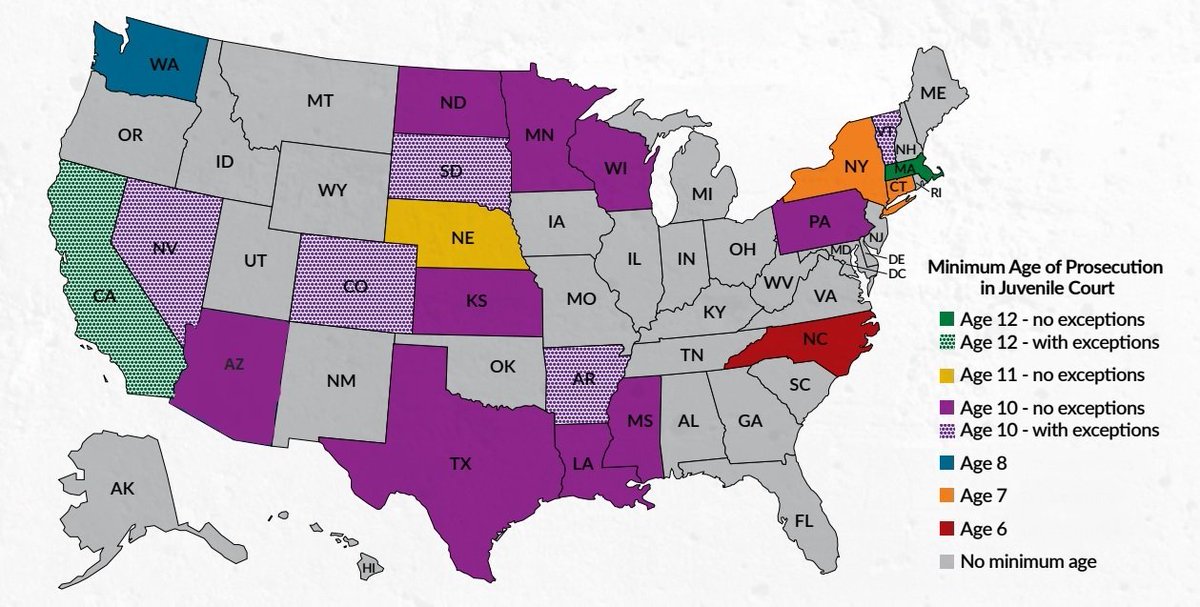Good morning, I'll be live tweeting from A109 this morning, 10:15am, cst. Get your campus clear, mask up, & bring your questions.
Let's start with a thinking challenge, at what age should a juvenile be sent to the adult court?
#CRJ107 #MoraineValley #RoleOfCourtsInJJS
Let's start with a thinking challenge, at what age should a juvenile be sent to the adult court?
#CRJ107 #MoraineValley #RoleOfCourtsInJJS
I'm SO excited to be live-tweeting here on campus, I can barely keep my eyes open. We are going to delve into Chapter 09, the Juvenile Courts
#CRJ107 #RoleOfTheCourtsJJS

#CRJ107 #RoleOfTheCourtsJJS


What factor is most important in consideration if a juvenile should be waived to the adult court?
#CRJ107 #MoraineValley #RoleOfCourtsInJJS
#CRJ107 #MoraineValley #RoleOfCourtsInJJS
Before the establishment of the first juvenile court, there was only one system of justice in the United States that served both the adult and the juvenile offenders
#CRJ107 #MoraineValley #RoleOfCourtsInJJS
#CRJ107 #MoraineValley #RoleOfCourtsInJJS

The juvenile court was first established in Cook County, Illinois (Chicago), by the passage of the Juvenile Court Act
#CRJ107 #MoraineValley #RoleOfCourtsInJJS
#CRJ107 #MoraineValley #RoleOfCourtsInJJS

THINKING CHALLENGE: In which way are juveniles most significantly different than adult offenders?
#CRJ107 #MoraineValley #RoleOfCourtsInJJS
#CRJ107 #MoraineValley #RoleOfCourtsInJJS
Generally, the juvenile court has jurisdiction over all acts of delinquency. Delinquency is any behavior committed by a juvenile that is prohibited by the juvenile law of the state
#CRJ107 #MoraineValley #RoleOfCourtsInJJS
#CRJ107 #MoraineValley #RoleOfCourtsInJJS

In most states, delinquency consists of two general categories:
~ Crimes
~ Status Offenses
#CRJ107 #MoraineValley #RoleOfCourtsInJJS


~ Crimes
~ Status Offenses
#CRJ107 #MoraineValley #RoleOfCourtsInJJS



THINKING CHALLENGE: When you were a teenager, what status offense did you commit?
#CRJ107 #MoraineValley #RoleOfCourtsInJJS
#CRJ107 #MoraineValley #RoleOfCourtsInJJS
THINKING CHALLENGE: What do you believe to be the most common status offense among teens today?
#CRJ107 #MoraineValley #RoleOfCourtsInJJS
#CRJ107 #MoraineValley #RoleOfCourtsInJJS
THINKING CHALLENGE: Should juvenile delinquents and juveniles in need of supervision be adjudicated in the same court system?
#CRJ107 #MoraineValley #RoleOfCourtsInJJS
#CRJ107 #MoraineValley #RoleOfCourtsInJJS
In some jurisdictions, juvenile courts are structured to be completely separate courts that only hear cases involving juveniles
#CRJ107 #MoraineValley #RoleOfCourtsInJJS

#CRJ107 #MoraineValley #RoleOfCourtsInJJS


In the juvenile court, the judge is the ultimate decision maker.
#CRJ107 #MoraineValley #RoleOfCourtsInJJS

#CRJ107 #MoraineValley #RoleOfCourtsInJJS


They do not simply rule on the facts of the case.
They need to have a wide range of options available in order to render a decision.
#CRJ107 #MoraineValley #RoleOfCourtsInJJS

They need to have a wide range of options available in order to render a decision.
#CRJ107 #MoraineValley #RoleOfCourtsInJJS


The juvenile court judge is usually responsible for hiring and firing staff, establishing court policies, and budgeting
#CRJ107 #MoraineValley #RoleOfCourtsInJJS

#CRJ107 #MoraineValley #RoleOfCourtsInJJS


The most important duties of a juvenile court judge involve the disposition of cases involving delinquents
#CRJ107 #MoraineValley #RoleOfCourtsInJJS

#CRJ107 #MoraineValley #RoleOfCourtsInJJS


The prosecutor represents the interest of the state in bringing the case against a juvenile. The prosecutor also represents the interests of the victim.
#CRJ107 #MoraineValley #RoleOfCourtsInJJS


#CRJ107 #MoraineValley #RoleOfCourtsInJJS



THINKING CHALLENGE: Which juvenile court actor has the most discretion in decision making in the juvenile court
#CRJ107 #MoraineValley #RoleOfCourtsInJJS
#CRJ107 #MoraineValley #RoleOfCourtsInJJS
THINKING CHALLENGE: Which juvenile court actor SHOULD HAVE the most discretion in decision making in the juvenile court
#CRJ107 #MoraineValley #RoleOfCourtsInJJS
#CRJ107 #MoraineValley #RoleOfCourtsInJJS
Probation officers are critical players in the juvenile court process
#CRJ107 #MoraineValley #RoleOfCourtsInJJS


#CRJ107 #MoraineValley #RoleOfCourtsInJJS



Ride Along with Probation Officer Merredith Murdock
@PlacerSheriff
@PlacerProbation
#CRJ107 #MoraineValley #RoleOfCourtsInJJS
@PlacerSheriff
@PlacerProbation
#CRJ107 #MoraineValley #RoleOfCourtsInJJS
Probation officers complete predisposition reports that assist juvenile court judges in determining the most appropriate disposition of the case after adjudication
#CRJ107 #MoraineValley #RoleOfCourtsInJJS
#CRJ107 #MoraineValley #RoleOfCourtsInJJS

The debate about the role of the juvenile court is essentially whether to retain its treatment-orientation or to follow the more punitive approach of the adult system
#CRJ107 #MoraineValley #RoleOfCourtsInJJS
#CRJ107 #MoraineValley #RoleOfCourtsInJJS

THINKING CHALLENGE: What philosophy should the juvenile court pursue?
#CRJ107 #MoraineValley #RoleOfCourtsInJJS
#CRJ107 #MoraineValley #RoleOfCourtsInJJS
The judge has wide latitude in deciding cases. Increasingly, mandatory waivers and sentences dictate the outcome of a case.
#CRJ107 #MoraineValley #RoleOfCourtsInJJS
#CRJ107 #MoraineValley #RoleOfCourtsInJJS

THINKING CHALLENGE: Who should decide if a juvenile is waived to the adult court?
#CRJ107 #MoraineValley #RoleOfCourtsInJJS
#CRJ107 #MoraineValley #RoleOfCourtsInJJS
Conservatives generally want a “get tough” approach to juvenile crime, & feel as though punishing delinquents like adults is acceptable, while liberals believe that not all juveniles are alike, should be handled on an individual basis.
#CRJ107 #MoraineValley #RoleOfCourtsInJJS

#CRJ107 #MoraineValley #RoleOfCourtsInJJS


THINKING CHALLENGE: Which philosophy most closely aligns to your ideals in regards to juvenile crime?
#CRJ107 #MoraineValley #RoleOfCourtsInJJS
#CRJ107 #MoraineValley #RoleOfCourtsInJJS
THINKING CHALLENGE: Should mandatory waive to adult court exist?
#CRJ107 #MoraineValley #RoleOfCourtsInJJS
#CRJ107 #MoraineValley #RoleOfCourtsInJJS
Cases of Kids Tried As Adults:
In 2014, Wisconsin 12-year-olds Anissa Weier and Morgan Geyser lured their classmate Payton Leutner into the woods where they stabbed her 19 times
washingtonpost.com/news/true-crim…
#CRJ107 #MoraineValley #RoleOfCourtsInJJS

In 2014, Wisconsin 12-year-olds Anissa Weier and Morgan Geyser lured their classmate Payton Leutner into the woods where they stabbed her 19 times
washingtonpost.com/news/true-crim…
#CRJ107 #MoraineValley #RoleOfCourtsInJJS


Cases of Kids Tried As Adults:
Jordan Brown, charged with homicide at 11 then exonerated, sues over ‘stolen’ childhood
post-gazette.com/news/crime-cou…
#CRJ107 #MoraineValley #RoleOfCourtsInJJS

Jordan Brown, charged with homicide at 11 then exonerated, sues over ‘stolen’ childhood
post-gazette.com/news/crime-cou…
#CRJ107 #MoraineValley #RoleOfCourtsInJJS


Cases of Kids Tried As Adults:
Jesus Mendez and Denver Jarvis, accused of setting Michael Brewer on fire, receive prison sentences
palmbeachpost.com/article/201202…
#CRJ107 #MoraineValley #RoleOfCourtsInJJS
Jesus Mendez and Denver Jarvis, accused of setting Michael Brewer on fire, receive prison sentences
palmbeachpost.com/article/201202…
#CRJ107 #MoraineValley #RoleOfCourtsInJJS

Cases of Kids Tried As Adults:
A Texas boxer was shot to death in his own home. The suspect: A 12-year-old boy
mysanantonio.com/news/local/cri…
#CRJ107 #MoraineValley #RoleOfCourtsInJJS
A Texas boxer was shot to death in his own home. The suspect: A 12-year-old boy
mysanantonio.com/news/local/cri…
#CRJ107 #MoraineValley #RoleOfCourtsInJJS

Cases of Kids Tried As Adults:
10-Year-Olds Robert Thompson and Jon Venables Took The Life Of A Toddler
edition.cnn.com/2001/WORLD/eur…
#CRJ107 #MoraineValley #RoleOfCourtsInJJS
10-Year-Olds Robert Thompson and Jon Venables Took The Life Of A Toddler
edition.cnn.com/2001/WORLD/eur…
#CRJ107 #MoraineValley #RoleOfCourtsInJJS

Cases of Kids Tried As Adults:
Curtis And Catherine Jones Fatally Shot Their Father's Girlfriend
usatoday.com/story/news/nat…
#CRJ107 #MoraineValley #RoleOfCourtsInJJS
Curtis And Catherine Jones Fatally Shot Their Father's Girlfriend
usatoday.com/story/news/nat…
#CRJ107 #MoraineValley #RoleOfCourtsInJJS

Prosecutors decide what charges are brought against an individual, whether or not the case moves forward or is handled informally
#CRJ107 #MoraineValley #RoleOfCourtsInJJS
#CRJ107 #MoraineValley #RoleOfCourtsInJJS

The prosecutors also bring about a disposition, either through an adjudication hearing or through plea bargaining. Prosecutors are usually responsible for initiating the transfer proceedings that waive juveniles to adult court for trial
#CRJ107 #MoraineValley #RoleOfCourtsInJJS
#CRJ107 #MoraineValley #RoleOfCourtsInJJS

Hearing to determine whether there is evidence beyond a reasonable doubt to support the allegations against the juvenile
#CRJ107 #MoraineValley #RoleOfCourtsInJJS
#CRJ107 #MoraineValley #RoleOfCourtsInJJS

Hearing held after a juvenile has been adjudicated to determine what sanction should be imposed on the juvenile
#CRJ107 #MoraineValley #RoleOfCourtsInJJS
#CRJ107 #MoraineValley #RoleOfCourtsInJJS

THINKING EXERCISE: Based on the historic changes to the juvenile court, what is the current direction?
#CRJ107 #MoraineValley #RoleOfCourtsInJJS
#CRJ107 #MoraineValley #RoleOfCourtsInJJS
Real Life Real Issues: Juvenile Justice
pbs.org/video/real-lif…
#CRJ107 #MoraineValley #RoleOfCourtsInJJS
pbs.org/video/real-lif…
#CRJ107 #MoraineValley #RoleOfCourtsInJJS
If you made it this far, send me a case in which a youth was waived to the adult court so we can discuss!
#CRJ107 #MoraineValley #RoleOfCourtsInJJS



#CRJ107 #MoraineValley #RoleOfCourtsInJJS




• • •
Missing some Tweet in this thread? You can try to
force a refresh
















